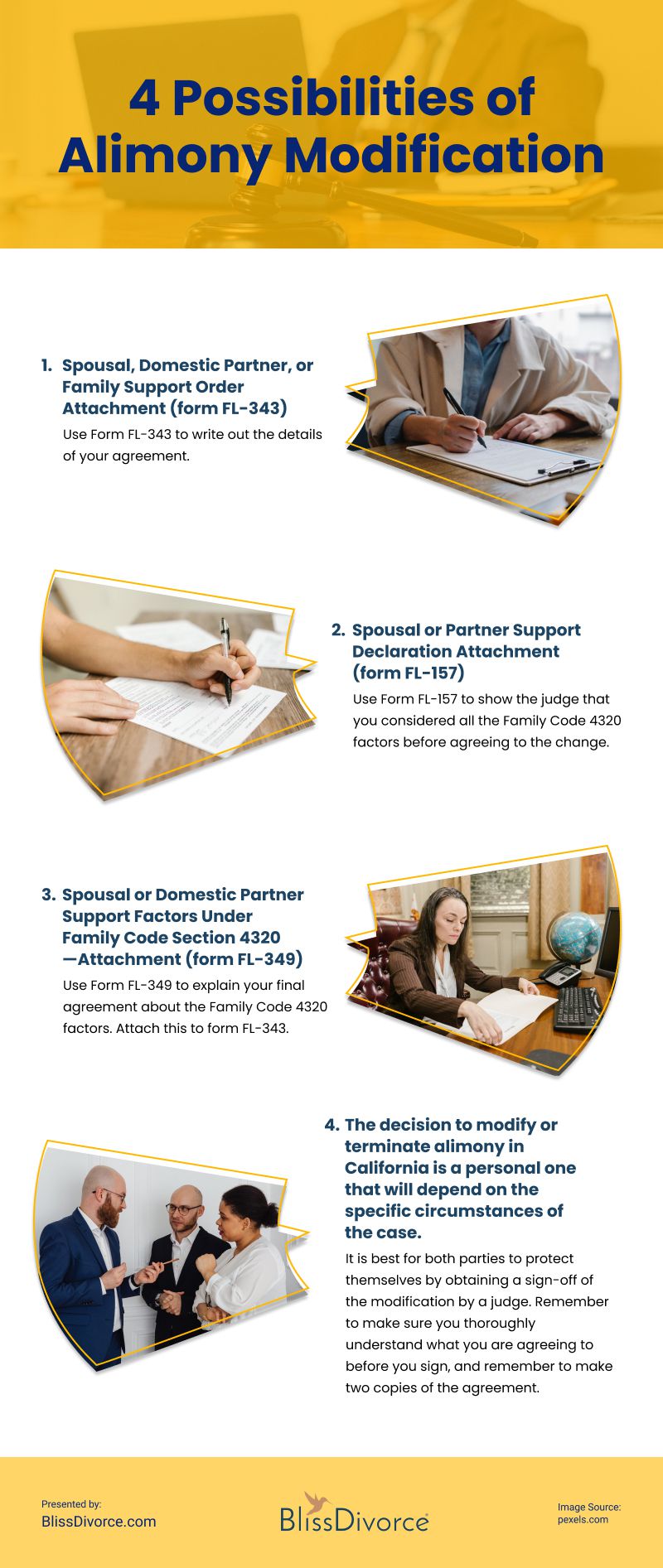While you cannot refuse to pay alimony, you may be able to modify the court order to reduce or eliminate the amount that you are obligated to pay your spouse. Getting out of spousal support in California is possible, but it is not always easy or straightforward.
To modify or terminate alimony, you will need to demonstrate to the court that there has been a significant change in circumstances since the original alimony order was issued.

Source: shutterstock.com / Photo Contributor: New Africa
What might justify a modification or termination of alimony?
Some common examples that might justify a modification or termination of alimony include the following:
- Agreement: The parties agree to modify or terminate alimony as part of a settlement agreement. A settlement agreement is for couples who can communicate and cooperate and are willing to reach a mutually satisfactory agreement.
- Change in the circumstances: Alimony may be modified or terminated if there is a significant change in the parties’ circumstances, such as a change in income or living situation. For example, if the paying spouse experiences a significant decrease in income or the recipient spouse becomes self-sufficient, alimony may be modified or terminated.
- Remarriage: Alimony may be terminated if the recipient spouse remarries. In most cases, remarriage is considered a significant change in circumstances that may justify the termination of alimony.
- Cohabitation: Alimony may be modified or terminated if the recipient spouse begins cohabitating with a new partner in a romantic relationship. In California, cohabitation is defined as “a relationship in which the parties are living together and having a romantic or sexually intimate relationship but are not married.” If the court finds that the recipient spouse is cohabitating, it may conclude that alimony is no longer necessary and may terminate or modify the award accordingly.
Keep in mind that the burden of proof is on the party seeking the modification or termination of alimony to demonstrate that there has been a significant change in circumstances. It is not enough to simply show that the circumstances have changed or that the alimony award is no longer fair or desirable.
Modifying or terminating alimony can be a complex process. It is important to understand that alimony is generally intended to provide financial support to a spouse who may not be able to support themselves after the divorce. If you are seeking to modify or terminate alimony, it is a good idea to be prepared to provide evidence of your changed circumstances to the court. This may include documents such as pay stubs, tax returns, and other financial records.
Additionally, it is important to consider the long-term effects of any changes to the alimony award. While it may be tempting to seek a quick resolution to the alimony issue, it is important to consider your decision’s long-term financial and personal consequences. For example, accepting a lower alimony award may provide short-term financial relief, but it may not be in your best interests in the long run. On the other hand, seeking to modify or terminate alimony may be necessary if there has been a significant change in circumstances, such as a loss of income or a change in the recipient spouse’s ability to support themselves.

Source: shutterstock.com / Photo Contributor: Vitalii Vodolazskyi
How do I modify or terminate alimony?
To modify or terminate alimony, you and your spouse must discuss and agree to the modification or that alimony is no longer needed. To change or terminate alimony, the spouses need to provide a written Declaration of the modification which they can write up themselves or they can go to their court self-help area and use court forms. This may be easier than writing their own Declaration. The Declaration of the modification needs to have the following information (Go to: https://selfhelp.courts.ca.gov/spousal-support/longterm/prepare-agreement):
Spousal, Domestic Partner, or Family Support Order Attachment (form FL-343)
Use Form FL-343 to write out the details of your agreement.
Spousal or Partner Support Declaration Attachment (form FL-157)
Use Form FL-157 to show the judge that you considered all the Family Code 4320 factors before agreeing to the change.
Spousal or Domestic Partner Support Factors Under Family Code Section 4320—Attachment (form FL-349)
Use Form FL-349 to explain your final agreement about the Family Code 4320 factors. Attach this to form FL-343
If the spouses prefer to hire an attorney to give advice and review the documents, they could obtain a “limited scope” lawyer. This means the attorney may charge a fixed fee or hourly to advise, review, or write up the documents.
After you and your spouse reach an agreement and sign the document, you must submit it to the court for the judge to review and approve it. Remember to make sure you thoroughly understand what you are agreeing to before you sign, and remember to make two copies of the agreement.
It’s important to know that spouses can not just verbally agree to modify or terminate the existing court order. It is best for both parties to protect themselves by obtaining a sign-off of the modification by a judge.
Ultimately, the decision to modify or terminate alimony in California is a personal one that will depend on the specific circumstances of the case. It is important to consider all the factors involved, including the needs of the parties, the interests of justice, and the tax implications of the decision.
Infographic
In California, the court determines spousal support (often called alimony) can be modified or terminated based on certain criteria. Suppose you’re looking at changing or discontinuing your current alimony payments. In that case, this infographic will direct you through all of the necessary considerations and steps needed for successful approval from the court. Take advantage of this informative resource, so individuals know their rights to modify spousal support agreements in California.

Video
*This article is for informational purposes only and is not intended to provide legal advice. If you require legal advice, please contact a licensed attorney in your local area.




